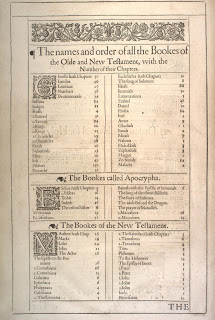 If one were to pick up a Jewish Old Testament and compare it to a Protestant Old Testament one would find there were some interesting differences in the Table of Context. The first seven books are the same in both, but after that things start to look a little different. Protestant Bibles include “Ruth” but Jewish Bibles go onto I and II Samuel.
If one were to pick up a Jewish Old Testament and compare it to a Protestant Old Testament one would find there were some interesting differences in the Table of Context. The first seven books are the same in both, but after that things start to look a little different. Protestant Bibles include “Ruth” but Jewish Bibles go onto I and II Samuel.
The reason for this is because there are different redactional values that have come to be employed in the organization of the same material.
Jews organize their booksin sections known as:
- The Torah (teaching)
- The Nevi’im (prophets) and
- The Ketuvim (Writtings)
The most important section for Jewish faith is the “Torah” so it is placed first, the second section includes most of the books that Protestants consider History as well as MANY of the books the Protestants consider Prophecy, but not all. The last section consists of all the books Protestants consider poetry but also some of the history and prophecy books in the Protestant arraignment.Jews end their bible with the books of I and II Chronicles, which leave the Bible with a sense of hope for the restoration of the kingdom of Israel, even though it leaves things off somewhat in the middle of the story of the Hebrew Bible.
In the first year of Cyrus king of Persia, in order to fulfill the word of the LORD spoken by Jeremiah, the LORD moved the heart of Cyrus king of Persia to make a proclamation throughout his realm and also to put it in writing:
“This is what Cyrus king of Persia says:
“‘The LORD, the God of heaven, has given me all the kingdoms of the earth and he has appointed me to build a temple for him at Jerusalem in Judah. Any of his people among you may go up, and may the LORD their God be with them.’”
Protestants Organize their version of the Hebrew Bible along the lines of
- Law
- History
- Poetry
- Prophets
The Law and History sections tries to tell the story through narrative ending this section in Nehemiah, which is the last narrative book chronologically in the protestant canon. Poetry is made up of everything that isn’t really a narritive structure, or a prophetic book. At the end protestants put the books of Prophecy. Which consist primarily of oracles and prophecies, although there are some books that include narratives based around individual prophets (Jonah, and Daniel). These prophets are often thought of ending the book with a different kind of hope.
The last book, Malachi, ends with the words:
“See, I will send the prophet Elijah to you before that great and dreadful day of the LORD comes. He will turn the hearts of the parents to their children, and the hearts of the children to their parents; or else I will come and strike the land with total destruction.”
THIS ending points to hope in a person. Christians understand the Elijah spoken of to be John the Baptist. John is the forerunner to Jesus. Christians end their Bibles with what they understand to be a pointer toward the coming of Jesus.
Catholic and Orthodox
Things get even more wild when you look at the Bibles of the two largest groups of Christians in the world today: the Catholics and the Orthodox. Their Bibles are based on the Septuagint, which was a Jewish collection of scriptures in use in the Time of Jesus, before the Jews canonized the Old Testament that is in use in their own tradition (and the version of the Old Testament that was adopted by the protestant reformers in the 16th century).
Instead of leaving a Gap between the Old Testament and the New Testament they include many books composed in what is known by protestants as the “inter-testimonial” period. Rather then believing there was a period of silence they have more of a chronological continuity. Their cannon tells the story of what happened in the centuries that followed Nehemiah. You begin to get a better feel for how Jewish life evolved as the people learned to live under a series of Empires.
The structure of the books follows the same basic divisions that the protestant Bible does (law, history, poetry, prophecy), and it ends with the same book of Malachi leaving
How does the Order of Books in the Bible change how the Bible speaks?
The order of the books frames what’s important to a community. They shape how the story is told in a profound way. The table of contents of a Bible is a deeply theological document. Here are a few observations on some of the differences.
- Jews show a deep value for the law, and point to a restored kingdom as a hope.
- Protestants look toward Jesus in their Old Testament, but allow for a time of silence that makes room for a theology of restoration which is foundation to some groups within the tradition (interestingly most of the non-restoration groups included the “removed” books in the Bibles until after restoration sects emerged)
- Catholics and Orthodox are less concerned with what exactly makes the cut. This seems to reflect a reliance on the church as a central authority and the Bible as a central element of tradition, but not the only game in town (Catholics never found it necessary to create a definitive Old Testament list until the Protestant reformation made the Canon a battle ground, and the only source from which they were willing to define dogma).
What are some observations YOU might make?












